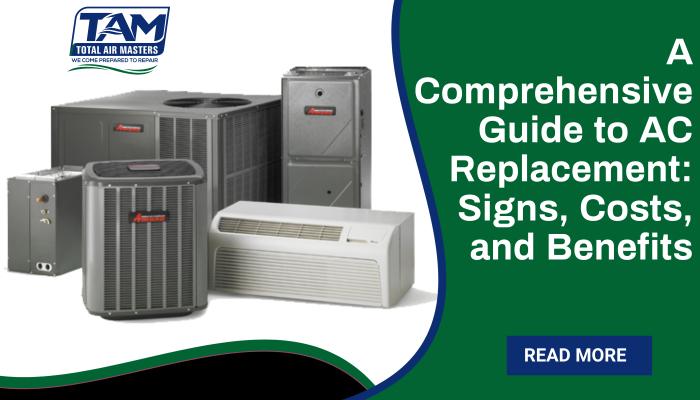
The air conditioning system in our homes plays a crucial role in maintaining a comfortable living environment, especially during the hot summer months. Over time, the performance and efficiency of your AC unit may decrease due to natural wear and tear, which may result in a need for AC replacement.
As your trusted AC company, we believe that understanding the ins and outs of AC replacement is essential for homeowners so they can make well-informed decisions when it comes to their cooling needs.
In this comprehensive guide, we will provide you with valuable insights into the world of AC replacement. We will cover the key signs that indicate your air conditioning system may be in need of replacement, the associated costs of purchasing and installing a new unit, and the benefits that come with upgrading your AC system. By being equipped with this knowledge, you’ll be better prepared when it’s time to invest in a new air conditioning unit for your home.
Recognizing the Signs: When to Replace Your AC
As a homeowner, staying in tune with your air conditioning unit’s performance can help you make timely decisions when it comes to AC replacement. Several signs indicate that it’s time for an upgrade, such as:
1. Frequent Breakdowns: If your air conditioner needs constant repairs, it’s a clear indication that the unit is nearing the end of its lifespan. Investing in a new AC installation may be more cost-effective in the long run compared to spending money on continuous fixes.
2. Rising Energy Bills: Noticed an unexplained increase in your energy bills? Your old AC unit could be the culprit. As these units age, they lose efficiency and consume more energy to maintain the desired temperature.
3. Reduced Cooling Efficiency: Struggling to keep your home comfortable during hot summer days? If your AC isn’t cooling your living space as it once did, or if there are noticeable temperature fluctuations, it’s time to consider AC replacement.
4. Aging Unit: Most air conditioning systems have a lifespan of around 10-15 years. If your AC is over a decade old and you’re experiencing performance issues, it’s likely time to replace it with a newer model.
Understanding the Costs of AC Replacement
Replacing an air conditioning system can be a significant investment, but it’s essential to understand the various costs involved. Here are the primary factors that determine the overall costs of AC replacement:
1. Unit Size and Efficiency: The price of a new AC unit will depend on its size, measured in British thermal units (BTUs), and its efficiency rating, measured by the Seasonal Energy Efficiency Ratio (SEER). Higher-capacity units with higher SEER ratings will usually cost more but can save you money in energy bills over their lifespan.
2. Installation Fees: You’ll also want to factor in professional installation fees. The cost of installation varies depending on factors like the complexity of the job, additional materials needed, and the labor involved. Always hire a reputable HVAC contractor to ensure a safe and efficient installation.
3. Additional Expenses: Depending on the specifics of your home and AC system, there may be extra costs for things like ductwork modifications, electrical upgrades, or disposal of your old unit. It’s important to discuss these potential expenses with your HVAC professional during your initial consultation.
Unlocking the Benefits of AC Replacement
Investing in a new air conditioning system comes with numerous benefits, both immediately and over time. These advantages include:
1. Improved Indoor Comfort: A new, efficient AC unit will cool your home more effectively and evenly than an older unit. You’ll enjoy consistent temperatures throughout your living space, regardless of the outdoor weather conditions.
2. Lower Energy Bills: With a higher SEER rating, a new air conditioner will consume less energy to maintain your desired temperature. This translates to lower monthly energy bills and long-term savings.
3. Enhanced Indoor Air Quality: Many modern air conditioning systems come equipped with advanced air filtration technology. By upgrading your AC unit, you’ll improve the indoor air quality in your home and create a healthier environment for you and your family.
4. Reduced Carbon Footprint: Eco-conscious homeowners can take comfort in knowing that a more energy-efficient air conditioner contributes to a reduced carbon footprint. By using less energy to cool your home, you’re taking a proactive step towards a greener future.
5. Increased Home Value: A new, energy-efficient air conditioning system can boost the overall value of your property, making it even more desirable to potential buyers should you decide to sell.
Making the Right Decision for Your Home
Deciding whether to replace your air conditioning system is a significant decision with long-lasting implications. This guide is intended to provide you with the knowledge and insights needed to make the best possible choice for your home.
Remember to consider common signs like frequent breakdowns, rising energy bills, reduced cooling efficiency, and an aging unit when evaluating your current system. Be sure to understand the various costs involved in AC replacement, including the unit itself, installation fees, and potential additional expenses.
Lastly, don’t forget the numerous benefits that come with investing in a new, energy-efficient air conditioning system, such as improved indoor comfort, lower energy bills, a healthier living environment, and a reduced carbon footprint.
With a clear understanding of the signs, costs, and benefits associated with AC replacement, you’ll be ready to make well-informed decisions when it comes to your cooling needs. If you’re considering AC replacement and need further guidance on this essential home investment, don’t hesitate to reach out to Total Air Masters for professional support and advice.
